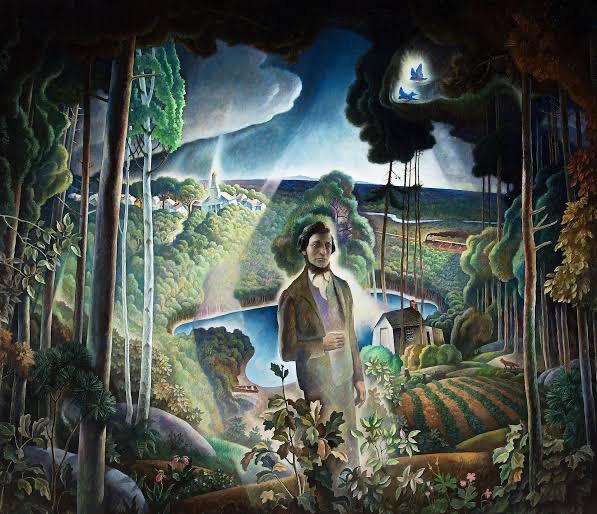Transcendentalism
Transcendentalism is a 19th-century school of American theological and philosophical thought that combined respect for nature and self-sufficiency with elements of Unitarianism and German Romanticism. Writer Ralph Waldo Emerson was the primary practitioner of the movement, which existed loosely in Massachusetts in the early 1800s before becoming an organized group in the 1830s.
Transcendentalism has its origins in New England of the early 1800s and the birth of Unitarianism. It was born from a debate between “New Light” theologians, who believed that religion should focus on an emotional experience, and “Old Light” opponents, who valued reason in their religious approach.
These “Old Lights” became known first as “liberal Christians” and then as Unitarians, and were defined by the belief that there was no trinity of father, son and holy ghost as in traditional Christian belief, and that Jesus Christ was a mortal.
Thinkers in the movement embraced ideas brought forth by philosophers Immanuel Kant and Georg Wilhelm Friedrich Hegel, poet Samuel Taylor Coleridge, ancient Indian scripture known as the Vedas and religious founder Emanuel Swedenborg.
A TRANSCENDENTALIST is a person who accepts these ideas not as religious beliefs but as a way of understanding life relationships.
The individuals most closely associated with this new way of thinking were connected loosely through a group known as THE TRANSCENDENTAL CLUB, which met in the Boston home of GEORGE RIPLEY. Their chief publication was a periodical called "The Dial," edited by Margaret Fuller, a political radical and feminist whose book "Women of the Nineteenth Century" was among the most famous of its time. The club had many extraordinary thinkers, but accorded the leadership position to RALPH WALDO EMERSON.
Margaret Fuller played a large part in both the women's and Transcendentalist movements. She helped plan the community at Brook Farm, as well as editing The Dial, and writing the feminist treatise, Woman in the Nineteenth Century.
Emerson was a Harvard-educated essayist and lecturer and is recognized as our first truly "American" thinker. In his most famous essay, "THE AMERICAN SCHOLAR," he urged Americans to stop looking to Europe for inspiration and imitation and be themselves. He believed that people were naturally good and that everyone's potential was limitless. He inspired his colleagues to look into themselves, into nature, into art, and through work for answers to life's most perplexing questions. His intellectual contributions to the philosophy of transcendentalism inspired a uniquely American idealism and spirit of reform.
Transcendentalism movement arose as a result of a reaction to Unitarianism as well as the Age of Reason. Both centered on reason as the main source of knowledge, but transcendentalists rejected that notion. Some of the transcendentalist beliefs are:
- Humans are inherently good
- Society and its institutions such as organized religion and politics are corrupting. Instead of being part of them, humans should strive to be independent and self-reliant
- Spirituality should come from the self, not organized religion
- Insight and experience are more important than logic
- Nature is beautiful, should be deeply appreciated, and shouldn’t be altered by humans
Major Transcendentalist Values
The transcendentalist movement encompassed many beliefs, but these all fit into their three main values of individualism, idealism, and the divinity of nature.
Individualism
Perhaps the most important transcendentalist value was the importance of the individual. They saw the individual as pure, and they believed that society and its institutions corrupted this purity. Transcendentalists highly valued the concept of thinking for oneself and believed people were best when they were independent and could think for themselves. Only then could individuals come together and form ideal communities.
Idealism
The focus on idealism comes from Romanticism, a slightly earlier movement. Instead of valuing logic and learned knowledge as many educated people at the time did, transcendentalists placed great importance on imagination, intuition and creativity. They saw the values of the Age of Reason as controlling and confining, and they wanted to bring back a more “ideal” and enjoyable way of living.
Divinity of Nature
Transcendentalists didn’t believe in organized religion, but they were very spiritual. Instead of believing in the divinity of religious figures, they saw nature as sacred and divine. They believed it was crucial for humans to have a close relationship with nature, the same way religious leaders preach about the importance of having a close relationship with God. Transcendentalists saw nature as perfect as it
was; humans shouldn’t try to change or improve it.





